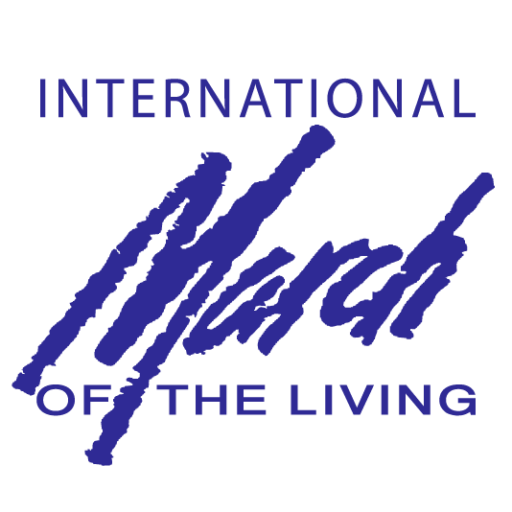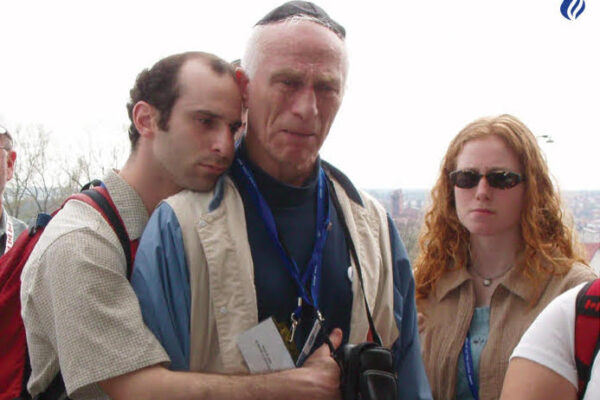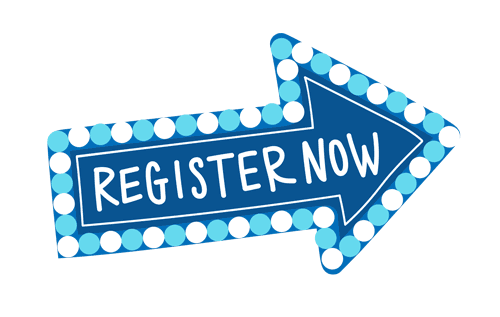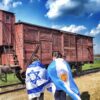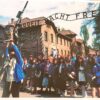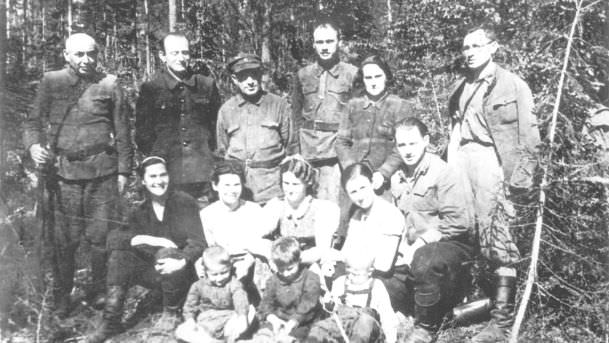
Jewish partisans safeguarding Jewish families in woodland in Nazi-occupied Poland, May 1944. Yad Vashem Archive
This summer, the Jewish Rescuers Citation was awarded posthumously to Wilfrid Israel, a long-forgotten German Jew. He saved the lives of thousands of Jews during the Holocaust, but lost his life in 1943 when, for reasons unknown, the plane he was on was shot down by the German air force. His citation was initiated by brothers Ilan and Ophir Behr of Kibbutz Hazorea, west of the Jezreel Valley, which Israel once visited and where he requested he be buried. The more deeply they delved into his story, the more puzzled the brothers became that this man’s name is not known to the public.
The citation was awarded by two organizations – the Committee to Recognize the Heroism of Jewish Rescuers During the Holocaust, and the B’nai B’rith World Center in Jerusalem – which for the past five years have been awarding such citations to 160 heroes around the world. The people being honored all had one thing in common: They were Jewish, and therefore could not receive official recognition from the State of Israel.
The list includes Berta Davidovitz Rubinsztejn, who was honored in the United States two years ago, having saved the life of a Polish-Jewish child who was smuggled into Hungary, plus a number of Jewish men and women who are no longer alive – like Wilfrid Israel, and Tamar Benshalom, a partisan from Budapest who provided money and forged documents to Jewish refugees, and also rescued Jews from a ghetto in Hungary.
Now, a number of Israeli lawmakers are trying to establish this private commemoration project in a more official capacity by amending the Yad Vashem Law, which would obligate the Holocaust martyrs and heroes remembrance authority to award citations to Jews who rescued Jews, and not only to gentiles who risked their lives to save Jews (the “Righteous Among the Nations”).
At first glance, this initiative – which was reported in Haaretz last Sunday – might seem like a measure that would attract broad consensus. But actually it has stirred up considerable disagreement among institutions, historians and Holocaust survivors.
‘Foolish idea’
“This is a very foolish idea that will create a terrible injustice,” says historian Prof. Moshe Zimmermann. “We would have to break away from the assumption that all Jews were heroes, and start weighing who was more heroic. Is a person who smuggled a child from the Umschlagplatz [transportation holding area] more worthy of a citation than someone who slipped a piece of bread into someone’s rucksack?”
Lili Haber, chairwoman of the Association of Polish Jews in Israel, doesn’t accept this approach. “True, life is complex,” she says. “But it would be terribly boring here if everything were black and white. The time has come to balance the familiar and simplistic picture of gentiles who saved Jews and Jews who went like sheep to the slaughter.”
Haber, whose father survived the Holocaust thanks to his inclusion on the famed list of righteous gentile Oskar Schindler, doesn’t diminish the importance of commemorating non-Jews who saved Jews – like the 26,000 “Righteous Among the Nations” that Yad Vashem has recognized since 1963. However, she says, “It is also necessary to commemorate the Schindlers who sprang up from among the Jews.” Indeed, this is something she actively does on her Facebook page, Jews Rescued Jews During the Holocaust.
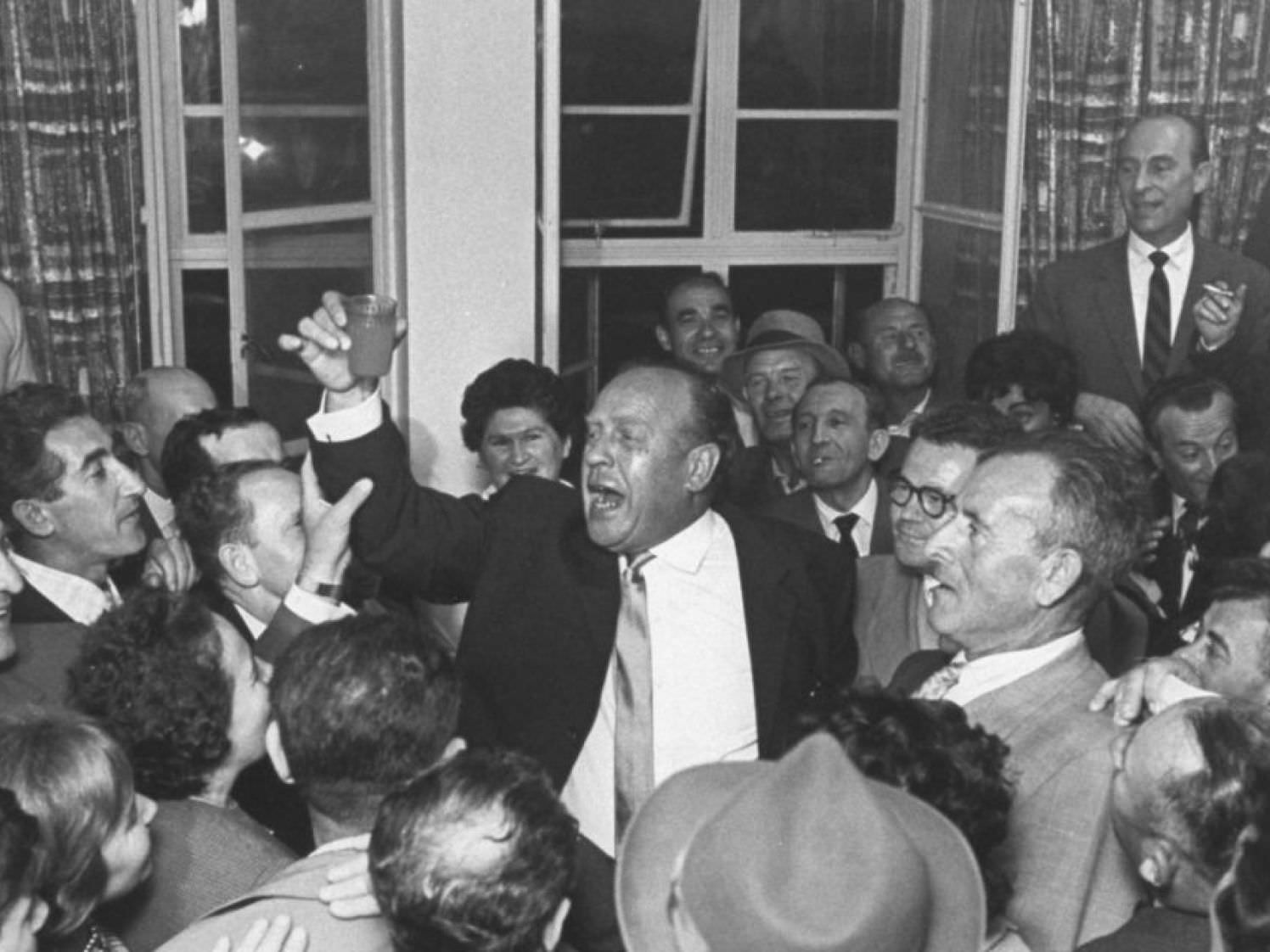
A reception for Oskar Schindler in Tel Aviv, 1962. A number of Israeli lawmakers believe Jewish heroes should also be recognized for their wartime efforts. Getty Images
Leading this activity in recent years is Holocaust survivor and social activist Haim Roth, who was born in Amsterdam in 1932. “The Jewish people does not give recognition to its heroes,” he says.
A reception for Oskar Schindler in Tel Aviv, 1962. A number of Israeli lawmakers believe Jewish heroes should also be recognized for their wartime efforts.Getty Images
Roth’s story exemplifies the complexity of commemorating the rescuers of Jews during the Holocaust. After his two sisters were sent to Auschwitz, his parents made contact with the Dutch resistance, which hid him with a Christian family. Eventually, his Christian rescuers were given recognition but the Jewish member of the resistance – “Without whom I would not be alive,” says Roth – was not accorded this honor because he was Jewish.
“It’s intolerable, the difference between the attitude toward righteous gentiles and the attitude toward Jews, in the context of the dangerous and persistent rescue efforts by Jews,” Prof. Asa Kasher wrote in a position paper about six months ago.
Kasher cited a case like the one Roth describes. “It is untenable,” he wrote. “In certain circumstances, a Jewish activist and a non-Jewish activist in the same rescue operation planned together, risked their lives together and succeeded together in what they tried to do, and Jews were rescued thanks to them. Is it conceivable to recognize the non-Jew in numerous good ways, as is customary with righteous gentiles, and to ignore in silence the Jewish part of the same rescue effort? In my opinion,” he concluded, “such a distinction is completely immoral.”
According to B’nai B’rith World Center Director Alan Schneider, “This isn’t the only case in which Jewish rescuers who worked together with non-Jews – and without whom the rescue activity could not have been conducted – have been intentionally ignored. There is an outrageous historical distortion here. By what right are these Jews’ [acts of heroism] being ignored? We think their activity should be lauded.”
Dr. Boaz Cohen, head of Holocaust Studies at Western Galilee College, says the decision to award the Righteous Among the Nations citation only to non-Jews “came from the assumption that Jews, as Jewish, showed solidarity toward their brethren because this was what was expected of them.” This stance is also the prent one at Yad Vashem, where it is argued that every Jew who was saved during the Holocaust owes his life to another Jew who helped him.
A recent example
However, not everyone agrees with this approach. In fact, Brig. Gen. (res.) Amir Haskel – a Holocaust scholar who leads delegations to Poland – believes the opposite to be true. “People have a tendency to stand on the sidelines and not help,” he says. “Therefore, a person who acts to the contrary is worthy of special esteem.”
Haskel says there is no need to go back to the Holocaust in order to understand this, using the story of Israeli rowing champion Yasmin Feingold – whose kayak overturned in the Yarkon River in 2009 – to illustrate his point. “A lot of people gathered along the banks of the Yarkon, but only one person [Avi Toibin] jumped in to rescue her,” he explains. “He was awarded the President’s Decoration and chosen to light a torch at the Independence Day ceremony – because there is a message here for the public.”
Gil Faran, head of the Polish tour guides association, agrees. “If there is behavior from the Holocaust period that should be reinforced, it is behavior of this sort – because being a murderer, informer or collaborator with the Nazis was ‘easiest,’” he says. “It wasn’t a trivial thing to save Jews in the Holocaust, even if you were Jewish,” Faran adds, saying it is now time for a rethink.
However, Faran – who knows numerous stories about extraordinary people from the Holocaust period – is fully aware of the complexity of the issue. “Was Chaim Rumkowski, head of the Judenrat [Jewish Council] in the Lodz ghetto, a rescuer of Jews or someone who collaborated in their murder?” he asks, invoking one of the most controversial figures in Holocaust history.
“What if you were a Jew who rescued 1,300 other Jews, but also ‘did business with the Devil’ and you were shot down in the street in Tel Aviv?” asks filmmaker Yonatan Nir, referring to Rudolf Israel Kastner. Nir, who has researched the rescue of Jews by other Jews, also notes the other side of the coin – that “people like Schindler, who were members of the Nazi Party, became righteous gentiles and Hollywood stars.”
In an attempt to establish criteria for the granting of citations, Dr. Anat Livne, director of the Ghetto Fighters’ House Museum in Western Galilee, proposes that only the most striking cases are chosen.
“There is no need to award a citation to every Jew who gave a piece of bread to a family member during the Holocaust period,” she says, “but rather, to those who helped others in an extraordinary way while taking an enormous risk.
“There is an endless number of such people,” she adds, mentioning the three Bielski brothers – the partisans who saved more than 1,200 Jews and fought the Nazis in occupied Poland during the Holocaust – and also the activists of the Jewish-French humanitarian organization OSE, which helped hundreds of Jewish children escape during the war.
“I understand the concern lest stories of Jewish heroism be forgotten,” says Cohen. But he says he believes the solution does not lie in legislation, but rather in research and education. And Yad Vashem is heavily involved in this regard: in symposia and conferences, ceremonies and study materials posted on its website, books, articles and the choice of torch lighters on Independence Day – which call attention to the actions of Jews who saved Jews during the Holocaust.
For example, the 2015 book “Who Shall Go Up For Us” is a collection of stories about Jews who saved Jews during the Holocaust, including the stories of Gisi Fleischmann of Slovakia; Rabbi Nathan Cassuto of Florence; Abush Werber of Belgium; Walter Süskind in Amsterdam; the Jewish partisans in Transnistria, and many more.
However, there are also differing viewpoints at Yad Vashem concerning this complex issue. Mordecai Paldiel served for a quarter of a century as director of its Righteous Among the Nations department.
In a opinion piece in The Jerusalem Post earlier this month, he wrote: “During those years, I also came across many names of Jewish rescue activists who worked in tandem with non-Jewish rescuers to save Jews from the Nazis. … These persons, who added risks to the danger already prent to help their fellow Jews, were forgotten after the war years.”
Dr. Yitzhak Arad begs to differ, though. A retired brigadier general in the Israeli army and a resistance fighter against the Nazis, he says he worked on the subject for 20 years. “But after a lot of approaches and thinking it over, I came to the conclusion that it is absolutely impossible to define a Jew who saved a Jew in the Holocaust,” he says. “This is an issue that will stir up a lot of quarrels, disputes and claims – and in any case, most of those involved in the matter are no longer alive.
Originally published HERE
